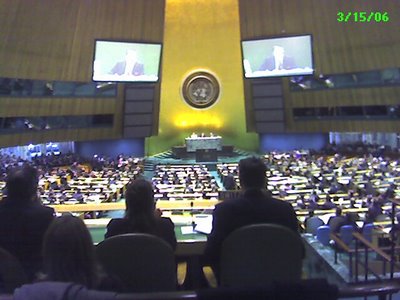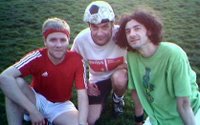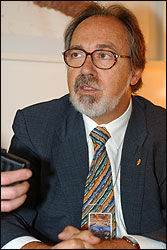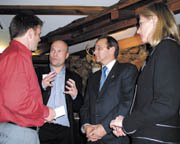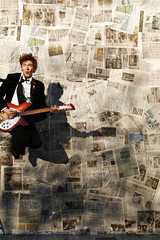In a detailed report, Matthew from
Inner City Press reports of UN Secretary General Ban Ki-Moon's comments in Switzerland, describing Geneva as "the biggest UN city". Bans support for Geneva had long been expected in Switzerland and was seen there as long overdue. Ban said in one of his speeches, he had "saved the best for last". This caused quite a discussion in the UN headquarters, as you can see below. Meanwhile, Swiss UN experts such as Simon Gemeperli from
NZZ saw no firm committment to Geneva in reports on the Secretary General's visit to Switzerland.

In Geneva, Mr. Ban, the Swiss president, Mrs. Ban, the Swiss Ambassador to the UN in New York, Peter Maurer
In UNCA-gate, Mr. Ban's Dig from Geneva Leads to Speechwriter Questions in New York
Byline: Matthew Russell Lee of Inner City Press at the UN: News Analysis
UNITED NATIONS, April 24 -- Speaking at a dinner for the correspondents' association at the UN in Genera on April 21, Ban Ki-moon began with a statement which his spokesperson has since characterized as a joke, and which is quoted from below.
Doubtless, there is a place for more humor in the UN system, on both sides of the Atlantic. And written transcripts cannot convey tone of voice or winks, if any. But the main job of a diplomat is to master communications. Lack of clarity, as the Federal Reserve's Alan Greenspan used to do it, should be intentional. It is difficult to imagine that the parochial echo in New York on Tuesday to Mr. Ban's Saturday remarks had been intended.
First, here are Ban's remarks, as emailed to reporters by the UN on April 23:
SG: "Mr. President of the Correspondents Association in Geneva, Ladies and Gentlemen,
"It's a great honor and pleasure for me to meet all of you. In fact, it is the first time for me to be invited by this whole Correspondents Association. I have not even been invited by UNCA, the United Nations Correspondents Association in New York. I hope that this fact, on the record, should be recorded from Geneva so that our people in New York know about this. I am personally very much honored. Normally I have been inviting journalists all the time in my life. It's almost the first time for me to be invited by an association of correspondents like this one today, and I am very much personally honored by this event. And thank you very much for your warm welcome...
"There is one thing which I have found, new information, is that Geneva is the largest UN city in the world, even larger than the United Nations Headquarters in New York. There are more international organizations, more diplomatic staff, more conference days in the year. This is what I have found, in the sense that it may be a real sense of a headquarters of the United Nations."
Tuesday at the UN's noon press briefing in New York, these statements were the subject to the first five questions, out of a total of only thirteen questions. Some are in true-jest now calling the matter "UNCA-gate," UNCA being pronounced Uhn-Cuh, the UN Correspondents Association. Five reporters, like this one members of UNCA, fastened on the statement that "I have not even been invited by UNCA, the United Nations Correspondents Association in New York. I hope that this fact, on the record, should be recorded from Geneva so that our people in New York know about this."
People in New York asked what this meant:
Inner City Press: There was this, I am sorry if I missed this, there was this speech by Mr. Ban in Geneva, in which he said that they were the first Correspondents' Association...
Correspondent [UNCA President]: I have to raise the issue officially. The Secretary-General met with the Association of Correspondents last week in Geneva, and he told them that we here, [the United Nations Correspondents Association (UNCA)], have never invited him out. So I wonder... and we have an official transcript of his remarks. My colleagues were shocked by the remarks, to say it mildly. I want to ask you, what was the reason for him to say that and why did he say that, in Geneva, while we had meetings with him here, in New York, at our invitation. And I am pretty sure that he enjoyed the meetings, also.
Correspondent [UNCA Past President]: And also, just to add, we did invite him to the annual UNCA dinner. He was seated with the [inaudible]. So all proper courtesies were extended to him by UNCA.
Spokesperson: Well, thank you to all three of you. I am sorry these remarks created a misunderstanding, which I want to lift immediately. It was meant in a light-hearted way by the Secretary-General. It was referring to the irritation expressed by some members of the Geneva press corps that he was not able to travel to our second headquarters at the Palais des Nations until last week. The comments were meant in jest, and not intended to be taken seriously. I can assure you, that the Secretary-General is most appreciative of his meetings with UNCA, particularly the two gracious invitations extended by you to him early in his tenure and, most recently, for his 100 days in office. He has told me how highly he values these informal exchanges and the exchanges he had with the correspondents' association. And the work you do, covering the UN, is to him essential...
Inner City Press: In his talk there, he said that Geneva was the largest UN city in the world and that there were more international organizations and more diplomatic staff. It may be the real UN headquarters. I am wondering, I don’t know if that was a joke as well, but if anyone could get the numbers, to know what the basis of this is. And also, I don't know if you will answer this, but who is writing his speeches now, like what is the process of that?
Spokesperson: I don't know if that was a speech. [See below.] He just improvised that. He was answering questions after a lunch. It was not a speech in any way.
Inner City Press: Got you. Can we get those numbers?
Spokesperson: Sure, sure, you can have those numbers on how many agencies there are in Geneva, how many people work there, that you can have. No problem there.
Sunny Correspondent: Just for the record, some in New York have advocated moving the UN out of New York, but… just for the record.
Correspondent [AP]: I would just like to make a suggestion that, since the transcript does appear on the UN website, that perhaps there could be a note attached saying that this was said in jest.
Spokesperson: Well, it is not right now on the website. It has been sent to you, but it is not on the website.
Correspondent [UNCA President]: Some diplomatic missions saw the transcript. I got a reaction from some missions also.
Spokesperson: Okay.
Inner City Press: Maybe there should be a section on the website for humorous speeches.
This hasn't yet happened. As some correspondents remarked later on Tuesday, at first Mr. Ban's jokes were accorded laughter. His "Ban Ki-moon is coming to town" song at the UNCA Ball in December (click here to view), his referrals to himself as the Slippery Eel, a more recent statement -- to UNCA in New York, as it happens -- that "you all must be disappointed in me." Some wondered: was he joking?
And that may be the point. The UN Secretary General doesn't intrinsically have much power. It is a bully pulpit, or place from which to play diplomat. In that game, if you're going to joke, make sure it's funny, or at least, make sure people who read it will know it was intended as a joke.
As documentation of Mr. Ban's statement that "Geneva is the largest UN city in the world, even larger than the United Nations Headquarters in New York," a spokesperson later on Tuesday gave Inner City Press a one-page print-out from the UN's Geneva web site, with a sentence highlighted that "with more than 1,600 staff, it is the biggest duty stations [sic] outside of the United Nations headquarters in New York." Inner City Press is informed that during his meeting with the Geneva UN staff union, Mr. Ban said he had "saved the best for last." And what to say in at the UN's hub in Nairobi?
In answer to which speechwriter is traveling with Mr. Ban, contrary to the UN's written transcript quoted above, the spokesperson began "I don't know who wrote that" -- click here for video, at precisely Minute 10:25.
On the question of Mr. Ban's speechwriters, it emerges that Edward Mortimer is gone, and that Richard Amdur is leaving. Coming in, Inner City Press is told, is Mike Myers -- not from Wayne's World or the bullpen, but from Newsweek. If this Mike Myers is taking the speechwriters job that was one of the 12 much-hyped mobility posts, that would be one that should be announced.

Labels: Ban, United Nations

 'Good Swiss' for the UN: Ambassador Maurer.
'Good Swiss' for the UN: Ambassador Maurer.


